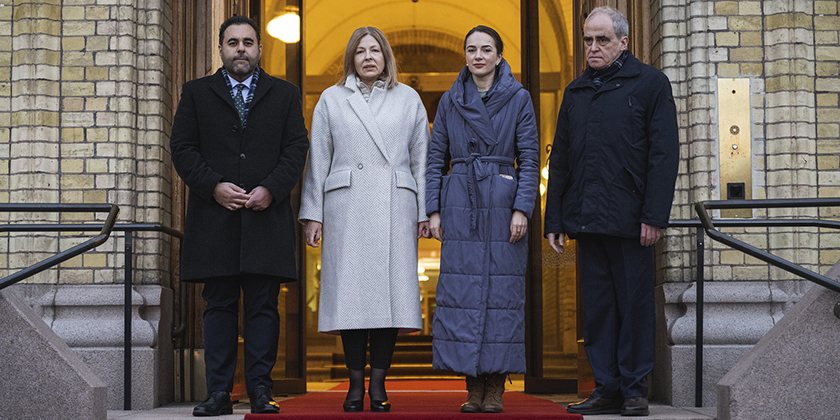
The recipients of this year’s Nobel Peace Prize were welcomed to the Storting on the morning of Sunday 11th December. Photo: Storting.
Nobel Peace Prize recipients at the Storting
The recipients of this year’s Nobel Peace Prize were welcomed to the Storting on the morning of Sunday 11th December. Here they met President of the Storting Masud Gharahkhani and members of the Standing Committee on Foreign Affairs and Defence.
The 2022 Nobel Peace Prize was given to the Belarusian activist Ales Bialiatski, the Russian human rights organization Memorial, and the Ukrainian Center for Civil Liberties. The prize was awarded in Oslo City Hall on Saturday 10th December.
“The Nobel laureates represent three different countries, yet all are fighting for the most fundamental things in an individual’s life and a democratic society: in particular, the right to live in peace, freedom of speech and the right to take part in democratic political debate,” said Masud Gharahkhani, President of the Storting.
Meeting with the Foreign Affairs and Defence Committee
The Peace Prize winners were represented by the following people:
- Natallia Pinchuk, Ales Bialiatski’s wife
- Yan Rachinsky from Memorial
- Oleksandra Matviichuk from the Center for Civil Liberties
After their meeting with the Storting President, the Peace Prize recipients met members of the Standing Committee on Foreign Affairs and Defence. Ine Marie Eriksen Søreide is the chair of the committee.
The visit to the Storting was part of the programme that had been put together in connection with the awarding of the Nobel Peace Prize. It has long been the tradition for the recipients of the prize to include such a visit while in Norway.
History
- The winner of the Nobel Peace Prize is chosen on an annual basis by the Nobel Committee, which is entirely independent in its work. In his will, Alfred Nobel made it the Storting’s responsibility to appoint the peace prize committee.
- We do not know for sure exactly why Nobel made Norway the home of the Peace Prize, or why he gave the Storting this job. One possible and regularly mentioned explanation is that the Storting at that time had made its mark in interparliamentary cooperation, particularly in its support of peaceful conflict resolution. This was considered the most important political peace issue of the day. Moreover, as recently as 1895, the Storting had shown its willingness to prioritize negotiation over armed conflict when trying to resolve the question of the union with Sweden.
Though it is the Storting’s duty to appoint the Nobel Committee, it should be stressed that the committee itself is entirely independent of the Storting and all other Norwegian authorities when making its decisions.
Sist oppdatert: 12.12.2022 15:59